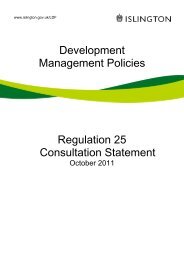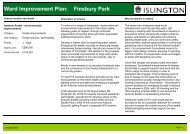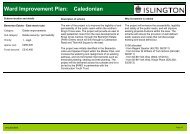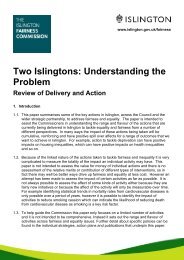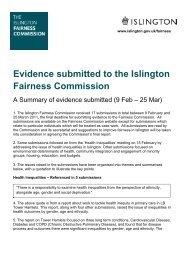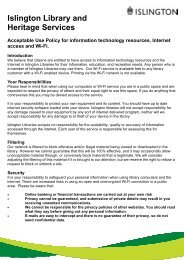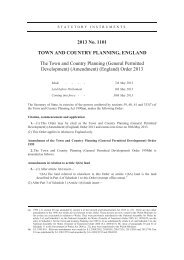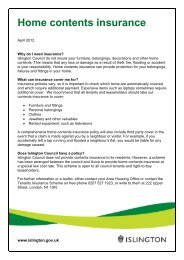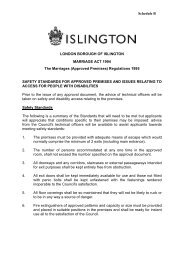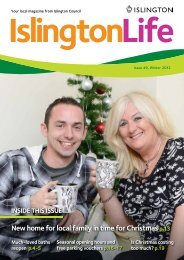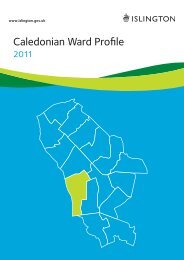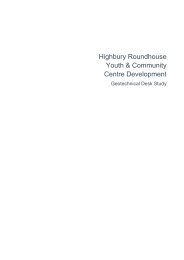The Islington Plan for Looked After Children and ... - Islington Council
The Islington Plan for Looked After Children and ... - Islington Council
The Islington Plan for Looked After Children and ... - Islington Council
Create successful ePaper yourself
Turn your PDF publications into a flip-book with our unique Google optimized e-Paper software.
5.1.2 Summary of outcomes<br />
a. Between 2009/10 <strong>and</strong> 2010/11, there was an 8% reduction in the number<br />
of initial assessments carried out by <strong>Children</strong>’s Social Care. This<br />
suggests that families are more often having their needs assessed <strong>and</strong><br />
met by a professional in the community, e.g. learning mentor, family<br />
support worker, health visitor through the Common Assessment<br />
Framework (CAF).<br />
b. <strong>The</strong> number of children becoming looked after has steadily decreased<br />
since 2004 although the rate of decrease has slowed down in recent<br />
years. <strong>The</strong> annual figures since the last plan are 290 (2008/9, 272<br />
(2009/10), 274 (2010/11). 2<br />
c. <strong>The</strong> number of children coming into care aged eleven to fourteen years<br />
has decreased since the Adolescent Multi Agency Support Service<br />
(AMASS) was established in 2006 to provide intensive support to support<br />
the parenting of adolescents.<br />
d. Changes in statutory guidance relating to homeless young people aged 16<br />
<strong>and</strong> 17 years have increased the numbers of 16 <strong>and</strong> 17 year olds<br />
becoming looked after.<br />
5.1.3 Challenges<br />
a. Successful pilots of the ‘think family’ <strong>and</strong> early intervention multi-agency<br />
approach have been implemented to support families with multiple needs<br />
over the last few years. <strong>The</strong>se included the Think Family Pathfinder <strong>for</strong><br />
families affected by parental mental ill health <strong>and</strong> the Packington Families<br />
Project <strong>for</strong> families living in an area of particular deprivation <strong>and</strong> disruption<br />
due to the rebuilding of their estate. <strong>The</strong> challenge is to mainstream the<br />
‘think family’ <strong>and</strong> early intervention approach across all of <strong>Islington</strong>’s family<br />
support services.<br />
b. <strong>The</strong> implementation of the Common Assessment Framework has been<br />
slow in the borough <strong>and</strong> families are still asked to repeat their stories<br />
many times to different professionals.<br />
c. <strong>The</strong>re is a need to make sure that we can deliver effective early<br />
intervention <strong>and</strong> family support services to families experiencing greater<br />
stress due to the recession whilst operating in a challenging financial<br />
context.<br />
2 <strong>The</strong>se figures exclude asylum seeking children <strong>and</strong> young people <strong>and</strong> young people presenting<br />
as homeless aged 16 <strong>and</strong> 17 years.<br />
14



